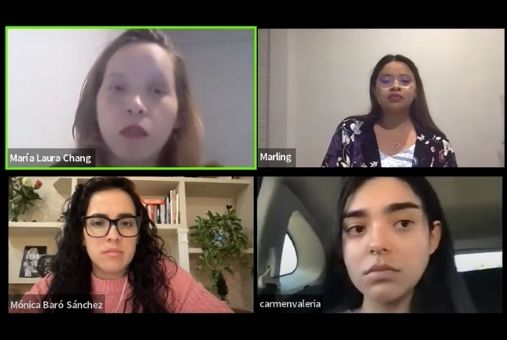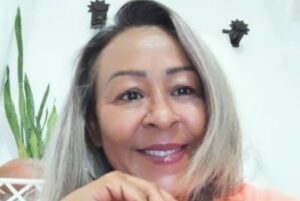Practicing journalism in authoritarian contexts presents a challenge. But when the journalist is a woman, the level of vulnerability increases. Sexist comments on social networks, invasion of privacy, intimidation involving children and family members, rape threats and gender-based insults are some of the situations faced by women journalists in several Latin American countries.
Last April, the Chicas Poderosas team held an online forum in which they invited a group of women journalists to talk about their experiences working in Cuba, Venezuela, Nicaragua, and El Salvador, countries where democracy has been weakened.
"I am always impressed by how the patterns of repression are repeated in the contexts of Nicaragua, Cuba, [and] Venezuela. These are countries that have different historical processes, but when we analyze how the crackdown of press freedom works, we notice many similarities. We must be aware of this in the region, because it is not exclusive to a single country, it can happen anywhere. Now we also see how El Salvador is becoming an authoritarian state," Cuban journalist Mónica Baró Sánchez said during the forum.
In Latam Journalism Review (LJR) we analyzed the situation of women journalists in each of these countries and interviewed the forum participants.

"When you do journalism and you are a woman, you are exposing yourself to being attacked. Not only for being a journalist, but also for being a woman who does journalism," Cuban journalist, Mónica Baró Sánchez, said. (Photo: Courtesy)
With increased Internet access on the island, the Cuban State media network has had to compete with the arrival of an independent media system that, in most cases, offers a discourse in opposition to the official one. These independent platforms are banned in Cuba and their reporters have suffered repression, arrests, communication blackouts, and threats from the Cuban government.
Recently, the Cuban National Assembly approved reforms to the Penal Code that prohibit independent media groups from receiving foreign funding. In this way, the Cuban government could further criminalize the work of independent journalists on the island.
One of these independent journalists is Mónica Baró Sánchez, who was part of the founding team of Periodismo de Barrio. She served as a reporter and member of its Editorial Board until 2018. She currently continues to write for CiberCuba, Revista El Estornudo and 23yFlager. Baró is in exile in Spain after she decided to leave Cuba due to threats and obstacles to her professional practice.
"Being a woman is an additional situation we have to deal with. Many of the aggressions I suffered on social media were macho, violating my privacy, questioning whether or not I had a partner, exposing issues of my personal life, etc.," Baró told LJR. "When you do journalism and you are a woman, you are exposing yourself to being attacked. Not only for being a journalist, but also for being a woman who does journalism," she said.
In 2016, Baró was detained by Cuban security forces along with eight other journalists while trying to cover the effects of Hurricane Matthew through eastern Cuba. While she was detained, she felt the vulnerability to which one is exposed for being a journalist and a woman.
"They asked us to undress, to lift our hair, we were left in our underwear. They also asked us to bend over and to cough to make sure we had nothing inserted in our vagina. It was a very humiliating situation," Baró told LJR. "It was military women who searched us but, all the same, it was clear that by doing that there was an important gender bias, because none of the men were asked to undress," Baró said.
In recent years, Nicaraguan journalism has experienced persecution and criminalization by the government. There is no separation of powers and all powers are in the hands of Daniel Ortega and his wife, Rosario Murillo.
State violence with a consequent increase in risk for doing their job has caused at least 120 Nicaraguan journalists to go into exile (since April 2018) to preserve their life, liberty and personal integrity; as recorded by El Colectivo Nicaragua Nunca Más.
Marling Balmaceda is managing editor for Artículo 66, one of the news outlets most critical of Daniel Ortega's government. She is currently in exile after deciding to leave her country for fear of what they might do to her family.
"I have talked to my female colleagues from Artículo 66 and they said that, just because they are women, the regime intermediaries attack them using personal information. They also include sons or daughters in their threats. One of our colleagues, who receives alimony, was told that she was kept by the government, so she should not criticize it," Balmaceda said at the Chicas Poderosas forum. "It is striking that those of us who do not have children are threatened by using our closest family members (parents, nieces, nephews, grandparents). This creates a generalized fear in our families as well. I left for Spain not because of what could happen to me, but because of them," Balmaceda said.
Balmaceda said that many of her female colleagues are in therapy because of the fear the Nicaraguan regime has sown among its adversaries and critics.
"They not only threatened her, but also told her in detail how they were going to do it to her, when they were going to do it, etc. Macabre stories that not only happen through social media, but they leave you a note or tell a friend or family member. They create a circle of fear that expands and ends up becoming a collective fear," she said.

Journalists invited to the Chicas Poderosas forum on journalism in authoritarian contexts. (Photo: Screenshot)
The Association of Journalists of El Salvador (Apes, by its Spanish acronym) has denounced that since the arrival of Nayib Bukele to power, there has been an increase in the limitation and criminalization of journalism in El Salvador. Apes registered a total of 421 cases of violations against journalists in El Salvador between 2019, the year in which Bukele took power, and 2021.
These agressions include physical and verbal threats, judicial investigations, and espionage, among others.
Salvadoran independent journalist, Carmen Valeria Escobar, told the Chicas Poderosas forum that "El Salvador is in leaps and bounds approaching Nicaragua," when speaking of violations of freedom of expression. She also emphasized how women journalists suffer different attacks than men who share the same profession.
"Women feel attacks very differently than men. We are threatened with rape, femicide, and insults are gendered, "bitch, whore." My male colleagues are not going to be attacked like that," Valeria Escobar said.
The journalist currently covers the Central American region for AJ Plus (social media publisher focusing on news and current affairs. It is owned by Al Jazeera Media Network, Qatar's international public media conglomerate), which has given her more exposure and, in turn, more margin to be attacked. "I recently published a video with AJ Plus and I didn't measure that it was going to have four times more impact than when I publish in an independent news outlet. I got insulted through social media. They were looking for personal information. I had to turn off the notifications for several days because there were too many," she said.

"In Venezuela, the regime is no longer so careful to intimidate a woman journalist," Venezuelan journalist, Gregoría Díaz, said. (Photo: Courtesy)
Non-governmental organizations in Venezuela have denounced that, from 2004 to date, the Chavista regime has closed more than 200 media outlets. In addition to these shut-downs, there have been attacks against journalists, plus intimidations and being forced into exile.
The Press and Society Institute of Venezuela recorded 380 violations of the guarantees of free expression and information in traditional and digital environments in the country in 2021 alone.
A journalist and correspondent for the independent digital media Crónica Uno, Gregoria Díaz remains in Venezuela despite having suffered harassment and intimidation. "We journalists in the regions [outside the capital] have reached a point of self-censorship because we know that whatever we may say or disseminate (even when the information is documented and fact-checked), we will always be considered fakes. It’s a perverse game. There is fear," Díaz told LJR.
Diaz believes, unlike other journalists at the forum, that when it comes to attacks, smears and threats, there is no gender bias. But she accepts that, in some cases, there can be some misogynistic reactions.
"In recent years there has been an escalation against women journalists where they mess with our personal lives. They expose our personal data on social media, for example. By this I don't mean that we are more vulnerable. But, certainly, there is no longer so much care on the part of the regime to intimidate a woman journalist. Before, they were much more careful and it was mostly men who were assaulted, threatened, harassed, and arrested. Lately, we women have entered this spiral of the government to silence us. But we are still here," Díaz concluded.